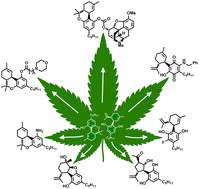“Breaking bud”: the effect of direct chemical modifications of phytocannabinoids on their bioavailability, physiological effects, and therapeutic potential
Abstract
Tetrahydrocannabinol (THC) and cannabidiol (CBD) are the two “major cannabinoids”. However, their incorporation into clinical and nutraceutical preparations is challenging, owing to their limited bioavailability, low water solubility, and variable pharmacokinetic profiles. Understanding the organic chemistry of the major cannabinoids provides us with potential avenues to overcome these issues through derivatization. The resulting labile pro-drugs offer ready cannabinoid release in vivo, have augmented bioavailability, or demonstrate interesting pharmacological properties in their own right. This review identifies and discusses a subset of these advanced derivatization strategies for the major cannabinoids, where the starting material is the pure phytocannabinoid itself, and the final product either a cannabinoid pro-drug, or a novel pharmacoactive material.



 Please wait while we load your content...
Please wait while we load your content...